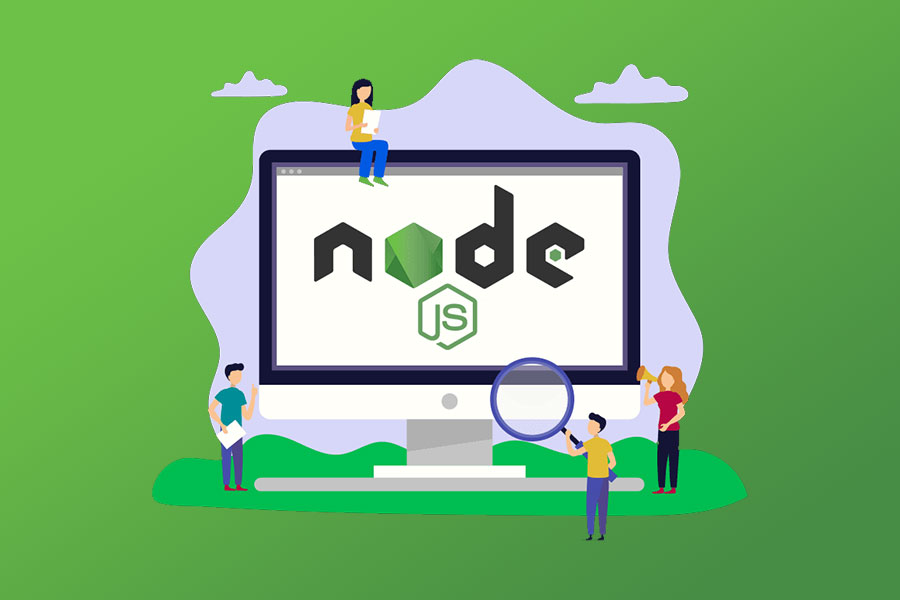Node.js and Microservices | A Comprehensive Overview
What is Node.js?
Node.js stands as a revolutionary runtime environment built upon Google Chrome’s V8 JavaScript engine, enabling the creation of server-side applications. As an open-source cross-platform environment, it empowers developers to craft server-side and real-time applications using JavaScript, bridging the gap between front-end and back-end development.
This unique architecture, written entirely in JavaScript, eliminates the need for traditional server-side scripting languages like PHP or Java. Leveraging an event-driven model and asynchronous nature, Node.js boasts efficiency and lightweight capabilities, making it a preferred choice for back-end developers seeking scalable solutions.
Why is NodeJS so powerful?
What sets Node.js apart is its ability to handle data-intensive applications seamlessly, thanks to its event-driven architecture and I/O model.
This makes it particularly suitable for real-time and scalable scenarios, as demonstrated by its adoption in major platforms like Netflix. Netflix utilizes Node.js to manage content streaming, efficiently handling millions of user requests while ensuring a smooth viewing experience. By leveraging Node.js alongside other JavaScript frameworks and tools, Netflix significantly reduced startup times and simplified the integration of microservices into their system.
Unlike traditional back-end languages like PHP, Node.js excels in handling concurrent requests through a single thread without blocking, ensuring uninterrupted performance. This distinction highlights Node.js’s superiority in managing modern web applications, making it a compelling choice for developers and businesses alike.

What makes NodeJS stand out from other server side Frameworks?
One of the standout features of Node.js lies in its asynchronous event handling through JavaScript callbacks, setting it apart from traditional server-side frameworks. Unlike its counterparts, Node.js operates within a single-threaded environment, showcasing its unique approach to handling server-side tasks.
In contrast, frameworks like PHP, JSP, and ASP.NET rely on multi-threaded web servers such as IIS or Tomcat, which inherently support multiple threads. However, this multi-threaded system comes with its own set of limitations, including restrictions on the maximum number of threads and reduced throughput beyond a certain threshold.
Issues with multi-threaded systems become apparent under heavy loads. They often consume excessive memory, experience thread wait times due to I/O operations, and suffer from increased context-switching and scheduling overheads with numerous threads.
These challenges underscore why Node.js has emerged as a preferred choice for many startups and large organizations. Its ability to efficiently handle millions of concurrent requests, coupled with its asynchronous architecture, makes it a compelling option for modern web development projects. As a result, businesses increasingly opt for Node.js development services to address their scalability and performance needs effectively.
Understanding the power of Node.js microservices architecture
Microservices architecture is a software design approach where applications are composed of loosely coupled, independently deployable services, each responsible for a specific business function. Unlike monolithic architectures, where all functionalities are tightly integrated into a single codebase, microservices break down the application into smaller, self-contained services that communicate through well-defined APIs. This decoupling enables teams to develop, deploy, and scale each service independently, fostering agility and innovation.
Node.js | The ideal runtime for microservices
Asynchronous and Non-blocking I/O – Node.js employs an event-driven, non-blocking I/O model, allowing it to handle a large number of concurrent connections efficiently. This makes it well-suited for building highly responsive and scalable microservices that can handle a massive volume of requests without blocking the event loop.
Lightweight and Fast – Node.js has a small memory footprint and starts up quickly, making it ideal for microservices where resource efficiency and fast deployment are paramount. Its single-threaded event loop architecture enables efficient utilization of hardware resources, resulting in high-performance applications.
Rich Ecosystem – Node.js boasts a vibrant ecosystem of npm (Node Package Manager) modules, offering a vast array of libraries and frameworks for building web servers, APIs, data processing pipelines, and more. This rich ecosystem accelerates development and enables developers to leverage existing tools and components to build robust microservices.
JavaScript Everywhere – With Node.js, developers can use JavaScript both on the client-side and server-side, enabling full-stack development with a single programming language. This eliminates the need for context switching between different languages and fosters code reuse and maintainability.
Benefits of Node.js microservices
Scalability – Node.js microservices can scale horizontally to handle increased load by adding more instances of individual services. Since each service is independent, scaling can be fine-grained, allowing organizations to allocate resources efficiently based on demand.
Agility and Faster Time-to-Market – The modular nature of microservices enables teams to develop, test, and deploy services independently, reducing dependencies and bottlenecks. This accelerates the development lifecycle, allowing organizations to iterate rapidly and deliver new features to market faster.
Fault Isolation and Resilience – In a microservices architecture, failures in one service do not necessarily impact other services, thanks to the loose coupling and fault isolation. This enhances system resilience and availability, as failures can be contained and mitigated without affecting the entire application.
Polyglot Architecture – Node.js microservices can coexist with services written in other programming languages, allowing organizations to adopt a polyglot architecture that leverages the strengths of different technologies for specific use cases. This flexibility enables organizations to choose the right tool for the job without being constrained by a monolithic stack.
Need help?
Harness the unparalleled expertise of PeritusHub’s Node.js specialists, equipped with a deep understanding of the intricacies of server-side JavaScript development. Trust us to elevate your projects with cutting-edge solutions and seamless execution.












